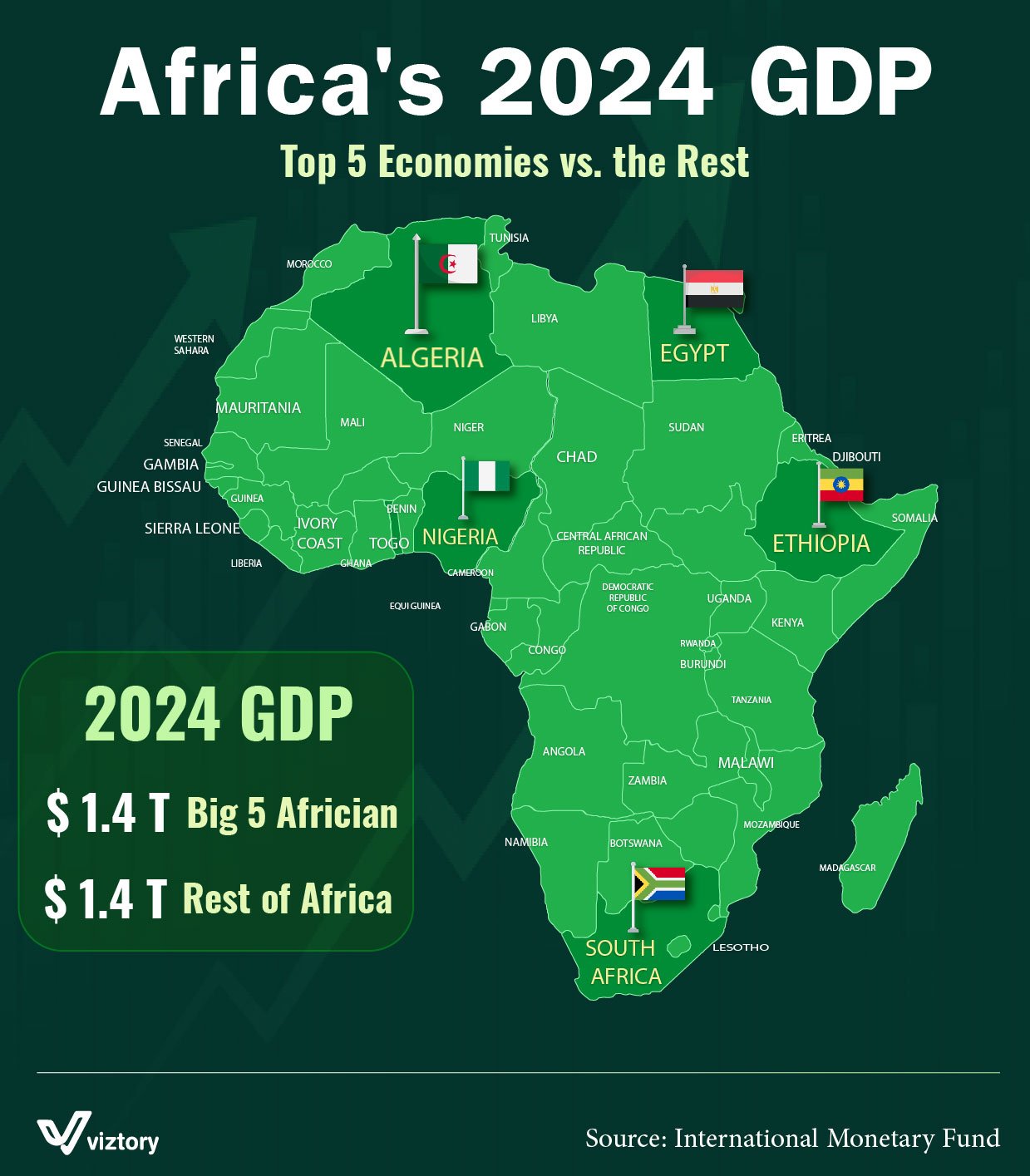Africa’s 2024 GDP
-
Oct, Fri, 2024
Africa’s Economic Powerhouses: A Look at the 2024 GDP Forecast
Africa’s economic landscape continues to evolve, with five countries leading the continent in terms of Gross Domestic Product (GDP). According to a 2024 projection, the top five economies in Africa are set to equal the economic output of the rest of the continent combined, highlighting significant disparities in economic power among African nations.
Top 5 Economies in Africa (2024)
- Nigeria
- South Africa
- Egypt
- Algeria
- Ethiopia
These five countries are expected to collectively generate a GDP of $1.4 trillion. In contrast, the remaining 49 African countries, combined, will also produce $1.4 trillion, meaning the economic weight of these five nations alone equals that of the entire remaining continent.
Nigeria: The Leading Economy
Nigeria remains Africa’s largest economy, driven by its vast natural resources, particularly in oil and gas. Beyond its oil sector, Nigeria is rapidly diversifying, with its technology and entertainment industries becoming more prominent players on the global stage. As Africa’s most populous nation, Nigeria benefits from a large domestic market and a burgeoning entrepreneurial ecosystem.
South Africa: A Regional Powerhouse
South Africa continues to play a pivotal role as one of Africa’s most industrialized countries. With a strong manufacturing sector, mining, and finance industries, it is a hub for multinational companies operating in sub-Saharan Africa. Despite recent economic challenges, South Africa remains influential, with a projected GDP that positions it firmly within the top five.
Egypt: A Strategic Economic Force
Strategically located at the crossroads of Africa and the Middle East, Egypt leverages its geography to boost trade, logistics, and tourism. Egypt’s economy is bolstered by the Suez Canal, which serves as a major artery for global trade, along with a diversified economy that includes agriculture, manufacturing, and construction.
Algeria: Oil-Rich Economy
Algeria’s economy is heavily reliant on hydrocarbons, with oil and gas accounting for the bulk of its GDP and exports. While Algeria has initiated reforms to diversify its economy, its future growth remains closely tied to the performance of global energy markets.
Ethiopia: Rising Star in East Africa
Ethiopia’s rise as a major economic player is particularly notable. Although it has faced challenges such as political instability, the country has made significant strides in industrialization and infrastructure development. With an ambitious plan to transform its economy, Ethiopia is increasingly becoming a hub for manufacturing and innovation in East Africa.
A Balanced Future?
The fact that the GDP of Africa’s top five economies equals that of the remaining countries underscores the economic imbalances within the continent. While some countries are experiencing rapid growth and industrialization, others continue to face developmental challenges, such as conflict, poor infrastructure, and a heavy reliance on agriculture.
This disparity also highlights the importance of regional cooperation and the potential for intra-Africa trade to stimulate economic growth across the continent. Initiatives like the African Continental Free Trade Area (AfCFTA) could help close the gap by improving market access, boosting local industries, and fostering investment across less-developed nations.
Conclusion
Africa’s economic future holds immense promise, with key nations leading the charge. However, the challenge remains for the continent to leverage its diversity and foster equitable growth across all regions. As the top five economies continue to grow, there is significant potential for the rest of the continent to rise in parallel, creating a stronger, more united Africa.

